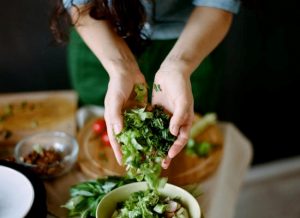Nutrition and cancer: why are nutrition recommendations different for cancer prevention compared to cancer treatment?
May 30, 2018
 Our next blog is by Dr Nicole Kiss, Senior Lecturer in Nutrition and Dietetics and Advanced Accredited Practicing Dietitian, Institute for Physical Activity and Nutrition, School of Exercise and Nutrition Sciences, Deakin University. This week is Cancer Research Awareness Week: 27th May – 2nd June 2018. One Australian dies every 12 minutes from cancer. Dr Kiss discusses the importance of nutrition during cancer prevention and treatment.
Our next blog is by Dr Nicole Kiss, Senior Lecturer in Nutrition and Dietetics and Advanced Accredited Practicing Dietitian, Institute for Physical Activity and Nutrition, School of Exercise and Nutrition Sciences, Deakin University. This week is Cancer Research Awareness Week: 27th May – 2nd June 2018. One Australian dies every 12 minutes from cancer. Dr Kiss discusses the importance of nutrition during cancer prevention and treatment.
Most people are aware of dietary recommendations to reduce their risk of chronic diseases like cancer. Indeed, with 1 in 2 people expected to face a cancer diagnosis in their lifetime, understanding lifestyle choices to reduce this risk is extremely important. However, less people are aware of what to eat while they are undergoing cancer treatment to optimise their health.
Nutrition and cancer prevention
The World Cancer Research Fund (WCRF) has just released the third expert report, ‘Diet, Nutrition, Physical Activity and Cancer’ on May 24th 2018. This report is a comprehensive analysis of studies in 17 different cancer types, involving over 51 million people focused on understanding the link between nutrition, physical activity and prevention of cancer. The findings from the report informed the development of the WCRF’s recommendations to prevent cancer. Similarly to dietary guidelines for general health, the cancer prevention guidelines recommend that we maintain a healthy weight, are physically active, eat mostly unprocessed foods with a particular emphasis on plant-based foods and avoid alcohol intake. More specifically for cancer prevention, we are advised to limit our intake of red meat, avoid processed meat and obtain all our nutrient needs from food rather than supplements.
How does this change during cancer treatment?
You might ask why shouldn’t you follow the same advice if you are going through treatment for cancer? Having a diagnosis of cancer places our bodies in a hyper-metabolic state, meaning that our need for energy and protein is generally increased. Some types of cancer, particularly those which involve the gastrointestinal tract can have a significant impact on the ability to eat enough to achieve a sufficient nutritional intake. Side effects from cancer treatment, including nausea, mouth ulceration and bowel problems can further limit nutritional intake leading to malnutrition.
In 2012 and 2014, large studies investigating the prevalence of cancer malnutrition were conducted across Victorian health services. These studies involved over 3,500 people with cancer receiving any type of cancer treatment. Approximately a third of the participants were malnourished with malnutrition associated with an increased risk of infection, a longer hospital stay and a greater chance of being admitted to hospital. Malnutrition in cancer is often not well recognised and can be present in someone who has experienced as little as 5% unintentional loss of weight and in people who are overweight or obese. All of this means that dietary advice while undergoing treatment for cancer needs to be personalised and started early to prevent the development of malnutrition. Personalised dietary advice has been shown to help people attain a better nutritional status and physical wellbeing and importantly improves quality of life.
What about after cancer treatment?
Recovery from cancer treatment can take time and depends on the type of cancer and the treatment. Generally, personalised dietary advice is still important during the recovery phase which may last from a few weeks to many months after completing cancer treatment. In the longer term, following completion of cancer treatment, the World Cancer Research Fund recommend returning to the same dietary advice to prevent cancer, so the advice comes full circle.
Dr Nicole Kiss, Nutrition and Dietetics and Advanced Accredited Practicing Dietitian
Institute for Physical Activity and Nutrition (IPAN), School of Exercise and Nutrition Sciences, Deakin University